Source (Google.com.pk)
Pakistani Wedding Dresses Pictures Biography
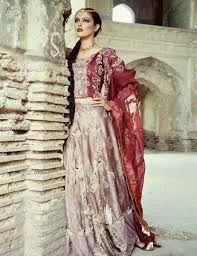
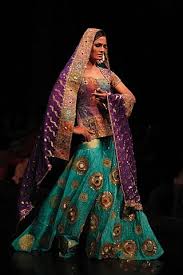
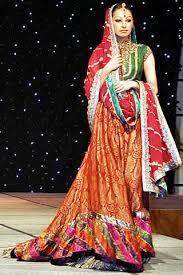
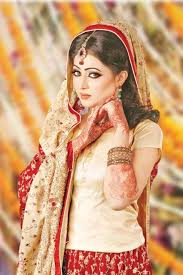
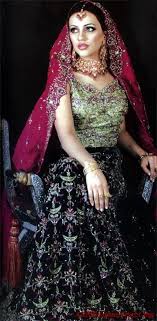



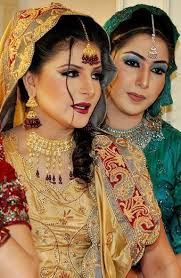
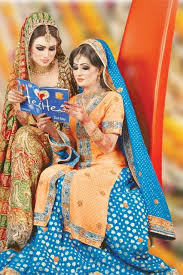


Pakistani Wedding Dresses Pictures Biography
A wedding is the ceremony in which two people are united in marriage or a
similar institution. Wedding traditions and customs vary greatly
between cultures, ethnic groups, religions, countries, and social
classes. Most wedding ceremonies involve an exchange of wedding vows by
the couple, presentation of a gift (offering, ring(s), symbolic item,
flowers, money), and a public proclamation of marriage by an authority
figure or leader. Special wedding garments are often worn, and the
ceremony is sometimes followed by a wedding reception. Music, poetry,
prayers or readings from religious texts or literature are also commonly
incorporated into the ceremony.A number of cultures have adopted the
traditional Western custom of the white wedding, in which a bride wears a
white wedding dress and veil. This tradition was popularized through
the wedding of Queen Victoria. Some say Victoria's choice of a white
gown may have simply been a sign of extravagance, but may have also been
influenced by the values she held which emphasized sexual purity.
Within the modern 'white wedding' tradition, a white dress and veil are
unusual choices for a woman's second or subsequent wedding. The notion
that a white gown might symbolize sexual purity has been long abandoned,
and is criticized by etiquette writers like Judith Martin as
distasteful.The use of a wedding ring has long been part of religious
weddings in Europe and America, but the origin of the tradition is
unclear. Historians like Vicki Howard point out that belief in the
"ancient" quality of the practice are most likely a modern invention.
Weddings performed during and immediately following the Middle Ages were often more than just a union between two people. They could be a union between two families, two businesses or even two countries. Many weddings were more a matter of politics than love, particularly among the nobility and the higher social classes. Brides were therefore expected to dress in a manner that cast their families in the most favorable light and befitted their social status, for they were not representing only themselves during the ceremony. Brides from wealthy families often wore rich colors and exclusive fabrics. It was common to see them wearing bold colors and layers of furs, velvet and silk. Brides dressed in the height of current fashion, with the richest materials money could buy. The poorest of brides wore their best church dress on their wedding day. The amount and the price of material a wedding dress contained was a reflection of the bride's social standing and indicated the extent of the family's wealth to wedding guests.
Weddings in India, Pakistan or Bangladesh can often be long, ritualistic, and elaborate affairs with many pre-wedding, wedding and post wedding ceremonies. Different countries and regions of a country celebrate the ceremonies in different ways according to their own marriage customs, rituals, and culture. In Pakistan, the Mehndi is often one of the most important and fun filled pre-wedding ceremonies, which is celebrated mainly by the bride's family. In Bangladesh, the Mehndi ceremony has traditionally been separated into two events; one organized by the bride's family and one, by the groom's family. Mehndi ceremonies take place outside India, Pakistan and Bangladesh amongst the South Asian community and places like Birmingham in the UK are such known hotspots for lavish Mehndi celebrations.
The ceremony is mainly held at the bride's house or at a banquet hall on the eve of the marriage ceremony or few days before the marriage. Generally the bride and groom attend the event together and on the occasion a professional henna artist or a relative applies mehndi to the bride's hands and feet. The designs are very intricate. Often hidden within the mehndi pattern the name or initials of the groom are applied. The event generally has a celebratory festival feel to it with the women dancing and singing traditional songs and the girls wearing vivid colors such as hot pink and yellow, often if the bride to be wishes to tease her future groom she will make him wear purple. The groom usually wears jutti instead of western footwear.
Weddings performed during and immediately following the Middle Ages were often more than just a union between two people. They could be a union between two families, two businesses or even two countries. Many weddings were more a matter of politics than love, particularly among the nobility and the higher social classes. Brides were therefore expected to dress in a manner that cast their families in the most favorable light and befitted their social status, for they were not representing only themselves during the ceremony. Brides from wealthy families often wore rich colors and exclusive fabrics. It was common to see them wearing bold colors and layers of furs, velvet and silk. Brides dressed in the height of current fashion, with the richest materials money could buy. The poorest of brides wore their best church dress on their wedding day. The amount and the price of material a wedding dress contained was a reflection of the bride's social standing and indicated the extent of the family's wealth to wedding guests.
Weddings in India, Pakistan or Bangladesh can often be long, ritualistic, and elaborate affairs with many pre-wedding, wedding and post wedding ceremonies. Different countries and regions of a country celebrate the ceremonies in different ways according to their own marriage customs, rituals, and culture. In Pakistan, the Mehndi is often one of the most important and fun filled pre-wedding ceremonies, which is celebrated mainly by the bride's family. In Bangladesh, the Mehndi ceremony has traditionally been separated into two events; one organized by the bride's family and one, by the groom's family. Mehndi ceremonies take place outside India, Pakistan and Bangladesh amongst the South Asian community and places like Birmingham in the UK are such known hotspots for lavish Mehndi celebrations.
The ceremony is mainly held at the bride's house or at a banquet hall on the eve of the marriage ceremony or few days before the marriage. Generally the bride and groom attend the event together and on the occasion a professional henna artist or a relative applies mehndi to the bride's hands and feet. The designs are very intricate. Often hidden within the mehndi pattern the name or initials of the groom are applied. The event generally has a celebratory festival feel to it with the women dancing and singing traditional songs and the girls wearing vivid colors such as hot pink and yellow, often if the bride to be wishes to tease her future groom she will make him wear purple. The groom usually wears jutti instead of western footwear.
Pakistani Wedding Dresses Pictures
Pakistani Wedding Dresses Pictures
Pakistani Wedding Dresses Pictures
Pakistani Wedding Dresses Pictures
Pakistani Wedding Dresses Pictures
Pakistani Wedding Dresses Pictures
Pakistani Wedding Dresses Pictures
Pakistani Wedding Dresses Pictures
Pakistani Wedding Dresses Pictures
Pakistani Wedding Dresses Pictures
Pakistani Wedding Dresses Pictures
Pakistani Wedding Dresses Pictures
Pakistani Wedding Dresses Pictures
No comments:
Post a Comment